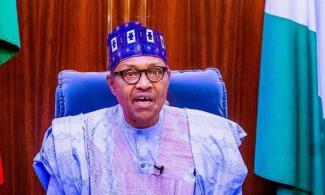
Meanwhile, SaharaReporters in October 2022 reported that Nigeria’s total external debt stood at $40.06bn under President Muhammadu Buhari’s government.
Mu'azu Jaji Sambo, the Minister of Transportation, has stated that the President Muhammadu Buhari-led administration hopes to complete ongoing rail projects across the country with multi-billion dollar loans from financial institutions based in China, Portugal, and Turkey.
The minister mentioned this when he appeared before the Joint National Assembly Committee on Land and Marine Transport, chaired by Senator Danjuma Goje on Thursday, adding that his ministry was focused on completing the Nigeria Railway Modernisation project.
He said, “Currently, the implementation of the Kaduna-Kano, Port Harcourt to Maiduguri and Kano-Maradi segments of the Railway Modernization is ongoing with the federal government counterpart funding in the 2022 appropriation.
“The ministry hopes that the Federal Ministry of Finance concludes negotiation of the loans with infrastructure development finance institutions of the Chinese, Portuguese and Turkish origin to implement the projects.
“To ensure finalising and signing of the loan agreements, evidence of source of funding of the balance of the advance payment and other aspects of work to be financed directly by the federal government has to be made available to these financial institutions through adequate budgetary provisions in the year 2023 budget and subsequent budgets."
Meanwhile, SaharaReporters in October 2022 reported that Nigeria’s total external debt stood at $40.06bn under President Muhammadu Buhari’s government, up from $10.32billion which his government inherited in 2015.
This showed that there was an increase of 288.18 per cent in seven years, according to the external debt stock reports by the Debt Management Office.
A breakdown shows that in 2015, 36 states had $3.27bn external debt while the Federal Government had $7.05bn.
By 2022, states’ external debt rose to $4.56bn, while the Federal Government’s external debt increased to $35.5bn.
The debts included loans from multilateral sources such as the World Bank, the African Development bank and the International Monetary Fund.
They also included bilateral loans from China, France, Japan, Germany and India, as well as commercial sources including Eurobonds and Diaspora bonds.
Nigeria’s external debt ballooned as the naira lost value, increasing Nigeria’s debt service burden and worsening its ability to service debt. The International Monetary Fund recently said that the long-term rate of the depreciation of the naira equated to a loss of 10.6 per cent of its value annually since 1973.
According to the IMF, this rate was 1.5 times higher than the long-term rate of the currencies of other emerging markets and developing economies at 7.2 per cent and sub-Saharan Africa at seven per cent over the same time period.